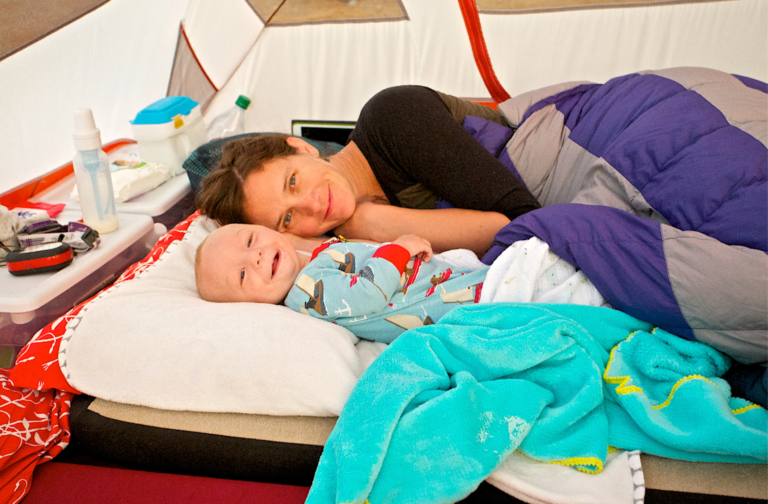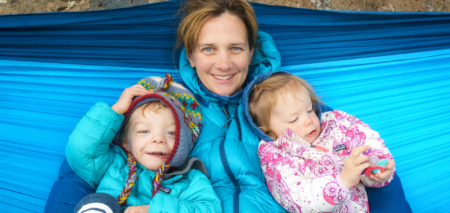Raising Kuba
All photos courtesy of Cydney Knapp
During her normal, healthy pregnancy, Cydney Knapp kept climbing, inching her way up the rock after easing her belly into a specially designed harness. A woman at the gym where Cydney and her husband, Bartek, first got acquainted had returned to climbing a week after she’d given birth, her newborn sleeping in a car seat while she climbed. Cydney was sure that would be her, too. But soon after her son, Kuba, was born, the Knapps noticed something was amiss. He couldn’t eat, and subsequent blood work came back abnormal. “He just had a lot of little quirks that didn’t add up,” Cydney said.
Kuba was diagnosed with an exceedingly rare genetic disorder, a triplication of 1p36.31-33 , about which so little is known that the Knapps still have no idea how his future will unfold. So far, he’s experienced developmental delays, and the Knapps believe he may need assistance throughout his life. “I was so determined to do all these things right when he was born, but [his needs] did shatter some of our expectations,” she said. “It was quite overwhelming.”
At first, time seemed to stand still as the Knapps adjusted to life with Kuba. He spent two weeks in the neonatal intensive care unit, and when they could take him home, he had to be tube-fed. Because he had low muscle tone, Kuba couldn’t easily sit in a car seat. “We’ve learned that you can make plans, but you have to be willing to adjust expectations and accept that those plans will change,” Cydney says. “Without fail, things just aren’t going to go as you expected.”
But the Knapps made a decision: They’d choose a path that would fit with their lifestyle and meet the needs of their son. They returned to some advice they’d received from a German couple they met soon before Kuba was born. The Germans had been driving a van along the West Coast for three months with their young children when they told the Knapps: Start when your kids are young; go places where they’ll be safe; and lower your expectations. Most of all: Just get out there and do it.

Cydney and Kuba, at 9 months old, on a two-month long paternity-leave road trip in Death Valley, California. They traveled from Seattle, Washington, to Wyoming, through Colorado, Utah and then up through California back home.
The Knapps took their first trip to Smith Rock State Park, around a six-hour drive from Seattle, when Kuba was 5 months old. It did not go smoothly. It was already hard for him to sit in his car seat, a difficulty compounded by the fact that Bartek came down with food poisoning on their last night there. On the long drive home, Bartek was still recovering from being sick, and Kuba was upset the whole time.
But they didn’t give up. When Kuba was 9 months old, they took their first two-month long road trip. To prepare, Cydney channeled her anxiety about the trip into being hyper-organized. “I kind of looked at what’s the worst-case scenario, and what can I do to plan for that?” she said. Armed with an organizational system that would make a space-launch look haphazard, the Knapp family departed Seattle, heading through Idaho, Utah and Colorado before swooping back up through California.
The trip had its difficult moments. But she says it was worth it. Even at 9 months, it was clear that Kuba thrived outdoors. “He was so happy just hanging out outside,” she says. “That trip could have been a tipping point where we say ‘OK, no. This is not worth it.’ But if anything, we said, ‘Yeah, we can do this.’”
Kuba is now 8 and the Knapps have since had two more children: Magda, who is 6, and Pola, who is just over a year old. When they spend time outdoors as a family, it’s evident to Cydney how much her kids enjoy it. Kuba and Pola entertain themselves without toys; they don’t fight or have meltdowns. “They explore, and they use their imaginations,” she says. “There’s just so much out there—they don’t need all the other implements to fuel their play.”

Kuba and Magda enjoy a snack break in Olympic National Park.
As a parent, Cydney says the biggest lesson she’s learned is to not underestimate her kids, genetic disorders or otherwise. “I feel like as parents, we’re often so aware of our kids’ limitations and extra needs and all the things that they can’t do. But it’s also important to give kids credit for what they can do.”

